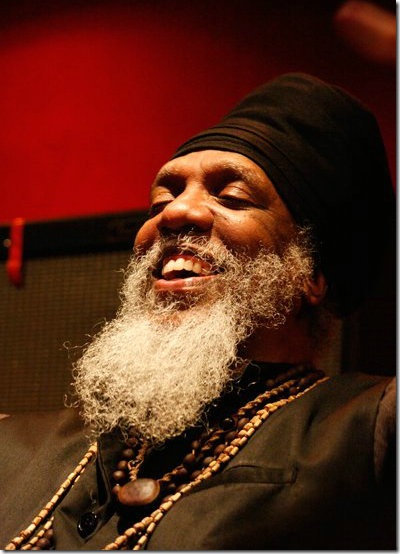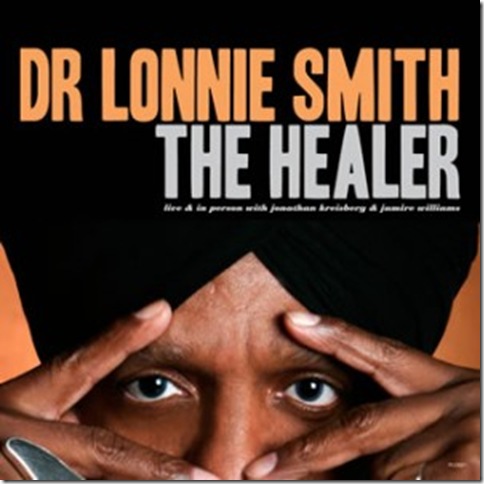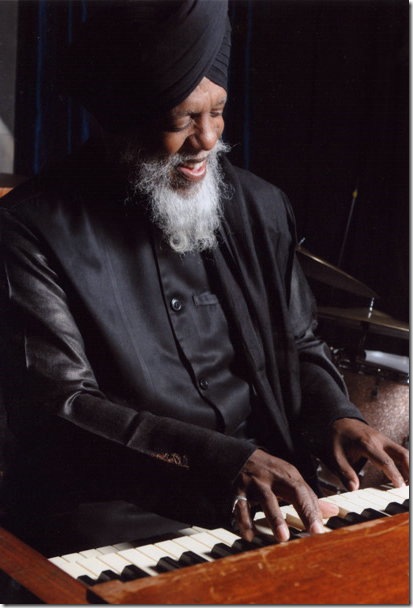Read it here first: 70-year-old Hammond organ icon Dr. Lonnie Smith has just released his first-ever CD in 2012, the burning live trio set The Healer.
Sure, the turban-topped keyboardist started recording under his own name with the 1967 gem Finger-Lickin’ Good while he simultaneously cut tracks with guitarist George Benson (for his banner releases It’s Uptown and The George Benson Cookbook) and saxophonist Lou Donaldson (the seminal soul-jazz recording Alligator Boogaloo).
But those albums were all released on either the Columbia or Blue Note labels.
The Healer, on the other hand, is the first release on Smith’s own new Pilgrimage Records imprint. Inspired by his young trio mates (guitarist Jonathan Kreisberg and drummer Jamire Williams) and aided by Kickstarter, the online funding organization, Smith now has a platform to release whatever new material and archival projects he sees fit. It’s a new start, a new career, and a first he never thought he’d see.
“Not ever,” Smith says by phone from Fort Lauderdale. “Benson had asked me if I was going to do that for years, and I’d always say no. But now that I’ve done it, I can see that it’s a beautiful thing.”
The Healer features Smith originals in the loping Backtrack, funky Dapper Dan, and his vocal-and-organ closing showcase Pilgrimage, along with covers from tranquil (Billy Strayhorn’s Chelsea Bridge) to frenetic (Harold Maebern’s Beehive). All tracks were recorded at either the Lamantin Jazz Festival in Hungary or the Jazz Standard in Manhattan.
Smith now lives in New York City for part of each year, and in Fort Lauderdale for the remainder. But he’s quick to point out that most of his time isn’t spent in either location.
“I spend more time on the road than anywhere else,” he says. “But it’s nice and quiet here when I can find the time to stay.”
The native of Buffalo, N.Y., found the time to initially stay in South Florida from the late 1980s to early 2000s, spending much of it in the house band at a popular Fort Lauderdale club called O’Hara’s. A young guitarist and future band mate saw him play there often, which made quitean impression. The favor would be returned down the road.
“I encouraged the Doc to start his own label,” says Kreisberg. “You get more of the money that way, and you have control over the material. And he has some great material.”
Kreisberg would know. The University of Miami graduate has had a gradual arc toward stardom, in both the United States and overseas, since he returned to his native New York City 15 years ago. His latest critically acclaimed CD, the 2011 release Shadowless, was released on his own New For Now imprint. Houston native Williams, who also plays in the band of gifted young trumpeter Christian Scott, is the youngest member of Smith’s multi-generational trio.
“Jonathan and Jamire are young enough and creative enough that they can jump into anything I might play,” he says. “They’re inspirational.”
“It’s a special group,” Kreisberg says. Jamire is a great young drummer, and we fuse jazz with soul, funk and psychedelia, which fits Doc’s personality.”
Much of Smith’s musical personality stems from early roots. He soaked up gospel, blues and jazz through the influence of his mother; sang in his own vocal group, The Supremes (which predated the Motown group of the same name), and taught himself to play both keyboards and trumpet.
“I learned to play completely by ear,” he says. “I had my own way, since I don’t read music. The band teacher at school couldn’t believe it on the first day he heard me. By the second day, he’d put me in the band, saying, ‘It looks like we have a star here!’ I made my own kinds of charts, and could get interesting sounds out of the organ, and took it from there.”
The young organist often took it to the Pine Grill, Buffalo’s prime jazz club in the 1960s, where he made impressions on both up-and-coming and veteran touring artists.
“[Guitarist] Grant Green wanted me to record with him, but I didn’t think I was ready,” Smith says. “I’d only been playing for about a year, but he heard something in my playing that even I didn’t hear. George Benson had been playing with a friend of mine, organist Jack McDuff, and I loved George’s playing too, so I gave him my number. He called; came to get me, and we went to his house in Pittsburgh and played two songs. George said, ‘Hey, Grant Green is playing in New York tonight. I we start driving now, we can catch him.’ Grant had us sit in, and after we played our two songs, he wouldn’t let me leave the stage!”
“So George tells me he’s leaving McDuff’s band and forming his own, and a week later, we’re playing at the same club where Grant was playing. John Hammond from Columbia Records heard about us and came in, and that did it. He signed George, and he signed me.”
Donaldson had also heard Smith play at the Pine Grill, and recruited the 25-year-old organist ― now a rising star through work with Benson and his Columbia solo debut recording ― for his Blue Note LP Alligator Boogaloo. Smith made an impression there, too, since his next several solo efforts were also released on Blue Note.
“Lou’s record went crazy,” Smith says, “and he’s telling me that his label wants me, too. I’d only been playing for a little while, and it all happened so fast. I didn’t even have a group, so when I toured, I’d use George’s band.”
Smith released several more records on various labels through the 1970s, and laid low by comparison for most of the ’80s before he relocated to South Florida.
“I’d decided that I didn’t really want to travel,” he says. “I was tired of being on the road, so once I started getting work in Florida, I figured I didn’t really need to go anywhere else. I travel a lot more now, but I pick and choose my spots so I don’t wear myself out. Been there; done that.”
Tribute CDs helped ease Smith back into the recording studio in the 1990s, notably to John Coltrane (the powerful Afro Blue) and Jimi Hendrix (the transcendent Purple Haze), both in a trio with guitarist John Abercrombie and drummer Marvin “Smitty” Smith. An unexpected 2003 nod to alt-pop star Beck, Boogaloo to Beck, led to the formation of Smith’s current trio and a handful of releases on the Palmetto label before the keyboard surgeon formed Pilgrimage Productions.
Its back-catalog songbook series will unveil many of the live and studio recordings from Smith’s career that were never released, and focus on his prowess as a composer.
“I’m trying to get together both CDs and DVDs,” he says. “People have no idea that some of this stuff exists, and now I have the means to finally release it. I also have an octet that’s playing at the Jazz Standard in January, and a 19-piece orchestra, and I want to get stuff by all of those groups out there.”
Kreisberg, a South Florida star since his college days at UM, will be on hand for the forthcoming appearance in Delray Beach by the recent Buffalo Music Hall of Fame inductee. Williams is busy elsewhere, but his place will be taken by Allison Miller. The Brooklyn-based drummer has a lengthy list of session credits that include Smith recordings, and she also leads her own band, Allison Miller and Big Molasses.
See the Dr. Lonnie Smith Trio at 8 p.m. Saturday, Dec. 29, at the Arts Garage, 180 NE First St., Delray Beach ($25-40, 561-450-6357).


